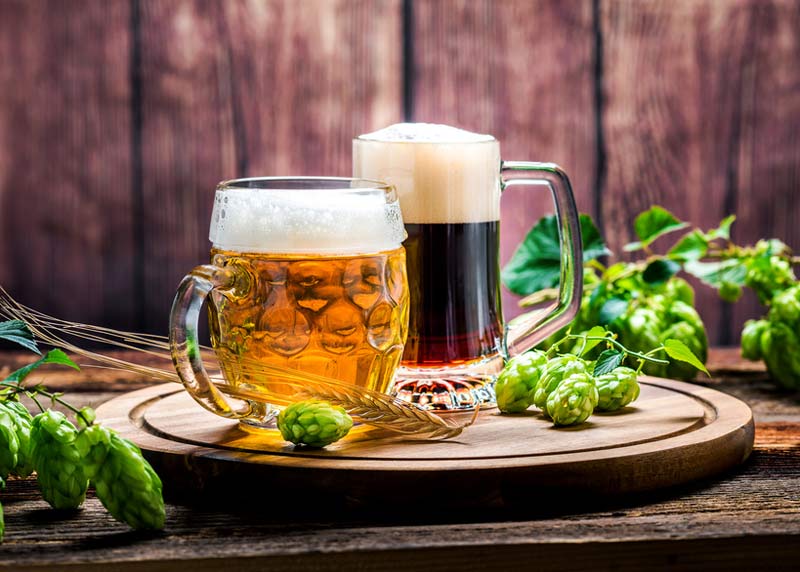Alcohol – a risk of diabetes?
Scientific support: PD Dr. Martin Füchtenbusch
The effect of beer and wine on diabetes risk is probably largely dependent on the amount. According to some studies, moderate alcohol consumption may slightly reduce the risk of type 2 diabetes.
Research shows that this is most likely to be true of drinking wine, and least likely to be true of drinking spirits. Whether alcohol actually does offer some protection against the onset of diabetes has not been definitively proven, and some study findings partially contradict the findings.

However, one thing remains clear: Heavy alcohol consumption significantly increases the risk of diabetes. It can lead to inflammation of the pancreas, which can promote both the onset of diabetes and pancreatic cancer. Furthermore, alcoholic drinks contain a lot of calories and can lead to weight gain, which in turn increases the risk of developing diabetes.
It must also be considered that alcohol increases the risk of other diseases, such as liver cirrhosis and various types of cancer; it appears that a completely safe amount does not exist.
To keep the risk as low as possible, the Federal Center for Health Education (BZgA) recommends no more than one standard glass per day for women, and no more than double this for men under 65 and one per day for those over 65. 1 standard glass corresponds to 0.25 liters of beer or 0.1 liters of wine.
However, these recommendations should not be understood as an invitation to consume alcohol on a daily basis. According to the German Center for Addiction Issues, the low-risk consumption of alcohol requires 2 alcohol-free days per week.
Further information on the topic of alcohol can be found on the information portal Know Your Limit (Kenn dein Limit) from the Federal Center for Health Education (BZgA) (Link in German).
What about alcohol when you already have diabetes?
Those already diagnosed with diabetes should also drink very responsibly. Apart from the fact that it is difficult to keep of track of blood sugar level when under the influence of alcohol, alcohol also causes a reduction in blood sugar level. Drinking at mealtimes means that the effects can be relatively well balanced out; however, drinking without even eating a snack can increase the risk of low blood sugar levels. This is often realized late due to the effects of the alcohol.
Considering that various studies have reported a protective effect of moderate alcohol consumption, the S2 Guideline Psychosocial Factors and Diabetes from the German Diabetes Association recommends: “People with diabetes should be made aware that moderate, low-risk alcohol consumption is compatible with good metabolic management and diabetes prognosis.”
Low-risk consumption means following the above mentioned BZgA recommendations. Furthermore, alcohol should only be consumed at mealtimes.
Sources:
Aerzteblatt online: Diabetes: Die richtigen Empfehlungen zum Umgang mit Alkohol. (Letzter Abruf: 03.07.2019)
Baliunas, D. O. et al.: Alcohol as a risk factor for type 2 diabetes: A systematic review and meta-analysis. In: Diabetes Care, 2009, 32: 2123-2132
Breuninger, T. A. et al.: Differential associations between diet and prediabetes or diabetes in the KORA FF4 study. In: J Nutr Sci, 2018, 7: e34
Deutsche Hauptstelle für Suchtfragen e. V.: Alkohol – Basisinformationen. 14. Auflage. 2017
Holst, C. et al.: Alcohol drinking patterns and risk of diabetes: a cohort study of 70,551 men and women from the general Danish population. In: Diabetologia, 2017, 60: 1941-1950
Knott, C. et al.: Alcohol Consumption and the Risk of Type 2 Diabetes: A Systematic Review and Dose-Response Meta-analysis of More Than 1.9 Million Individuals From 38 Observational Studies. In: Diabetes Care, 2015, 38: 1804-1812
Kulzer, B. et al.: S2-Leitlinie Psychosoziales und Diabetes – Langfassung (Teil 1). In: Diabetologie, 2013, 8: 198-242
As of: 09.03.2020



